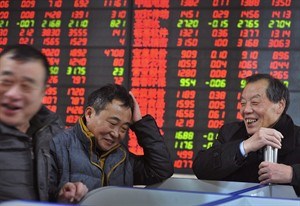
In this Dec. 4, 2014 photo, investor share a light moment as they check on stock prices at a brokerage house in Fuyang in central China's Anhui province. Economic growth fell to a five-year low of 7.3 percent in the latest quarter but investor sentiment was recharged by Beijing’s surprise interest rate cut Nov. 22 that is expected to put a floor under the slump. (AP Photo) CHINA OUT
December 08, 2014 - 2:19 AM
BEIJING, China - Gong Bin, a marketing employee in Shanghai, watched Chinese stock prices gallop upward for months before he finally gave in and put the equivalent of 2 1/2 months' salary into the surging market.
In two months, Gong made a 10 per cent return on his 20,000 yuan ($3,300) investment.
"My colleagues were always talking about the money they made from the market, so I thought, why not?" said Gong, 27. "It turned out to be the right decision."
Even as a downturn in the world's second-largest economy deepens, Gong and a growing army of other small investors are riding a boom in China's volatile stock markets.
Buoyed by hopes for an economic rebound combined with outright cheerleading by the state press, the market benchmark has soared 49 per cent since June, including 8 per cent last week alone.
Economic growth fell to a five-year low of 7.3 per cent last quarter but investor sentiment was recharged by Beijing's surprise interest rate cut Nov. 22 that is expected to put a floor under the slump.
"Investors anticipate the economy will bottom out sometime in the spring, and they are buying equities to take advantage of that," said economist Dariusz Kowalczyk at Credit Agricole CIB.
Still, he cautioned, "I think the prospects for the economy are just not good enough to take the equity market significantly higher."
In a new sign of economic weakness, customs data Monday showed China's imports fell 6.7 per cent in November compared with a year earlier instead of recording the small gain forecasters expected. Exports grew by an unexpectedly weak 4.7 per cent, down from October's 10.6 per cent rate.
Despite that, the Shanghai benchmark ended the day up another 2.8 per cent.
Small investors have repeatedly been burned by booms and busts in Chinese stock markets that are rife with complaints of fraud and insider trading. But with interest paid on savings accounts low, Chinese investors appear willing to make big bets on stocks and real estate.
Zhao Shizhong, who works in finance for a chain of restaurants, said he has 600,000 to 700,000 yuan ($100,000-$110,000) invested. He said his biggest trade lately was 60,000 to 70,000 yuan ($10,000 to $11,000) — the equivalent of a year's salary.
"This past week, I did more trading than usual, bought some and sold some," said Zhao. "I won't trade more in the near future. I feel it is time to control risk."
State media and China's securities regulator have warned investors not to act recklessly. But in a system in which the stock market is heavily influenced by government policy changes and often has little to do with economic performance, those mildly worded cautions are drowned out by a drumbeat of official calls for them to pile into stocks.
"China needs a magnificent bull market," said the China Securities Journal on Monday.
It said robust stock markets are required as part of the Communist Party's plans to make the economy more market-oriented and efficient.
China's communist-era stock market dates to 1990, when the Shanghai Stock Exchange began trading shares of a handful of state-owned companies in a crowded hotel room.
Despite their free-market image, the Shanghai exchange and a smaller second exchange in Shenzhen, near Hong Kong, have so far been used mostly to raise money for state industry.
Private companies have been allowed to join the exchanges in recent years, but the majority of shares traded are those of government companies such as PetroChina Ltd., China Mobile Ltd. and Bank of China Ltd.
And buying shares in state companies gives outside investors no voice in management, which is appointed by the Communist Party.
Cash-rich state companies also pay little in dividends despite repeated promises by the ruling party to make them share more of their wealth with the public. That means profits for investors have to come from other traders buying their shares at a premium, which adds to incentive for schemes to inflate share prices.
"We note that price manipulation and other illegal activities are on the rise in the stock market," a spokesman for the securities regulator, Deng Ge, said Friday.
The frenzy accelerated last week, when the value of shares changing hands each day soared on Friday to 1 trillion yuan ($160 billion), up from 715 billion yuan ($115 billion) from late November until then, according to the China Securities Regulatory Commission.
Also Friday, the number of new trading accounts opened soared to 179,700, up from a daily average of 97,000 from Nov. 24 through Thursday. Earlier this year, that daily average was 29,000, or one-sixth of Friday's level.
The takeoff in prices began after state media said during the summer that stocks were cheap.
"This seems to have convinced many that the government was determined to see the market rise," said Mark Williams, chief Asian economist for Capital Economics, in a report. "Resulting enthusiasm has to some extent now become self-reinforcing."
___
AP researcher Fu Ting in Shanghai contributed.
News from © The Associated Press, 2014